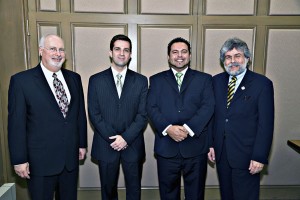
Dr. Dwight N. Bashir (second from left), deputy director for Policy and Research for the U.S. Commission on International Religious Freedom, was the guest speaker for the 2011 Herzog Lecture. He was welcomed to The John Marshall Law School by (from left) Professor Gerald Berendt, chairman of the program; Professor Shahram Dana and Associate Dean of Academic Affairs Ralph Ruebner.
The struggles in the Middle East are likely to continue as people in the region seek a better quality of life and more freedom to practice their religious beliefs, predicted Dr. Dwight N. Bashir, deputy director for Policy and Research for the U.S. Commission on International Religious Freedom. Bashir was the guest presenter for The John Marshall Law School’s Dean Fred F. Herzog Memorial Lecture on Feb. 17. He has traveled through the Middle East and North Africa and drafted numerous reports on the status of religious freedom and related human rights. Bashir also has advocated for the implementation of new policies that he has recommended to Congress.
Bashir expects to see sweeping changes with long-term ramifications. The turmoil of the past month is evidence that the past anti-Western rhetoric—especially against the United States
and Israel—that has systematically been used to justify the poor conditions in the Middle East, is no longer viable as an answer to the many problems they face. At the same time, Bashir says he recognizes that the Middle East is looking for “stability and security.” He stressed that “tolerance was essential for religion to thrive” in the region. He concluded that the United States must use its position of influence in the global community to promote greater freedom of religion and to condemn the persecution of religious minorities.
